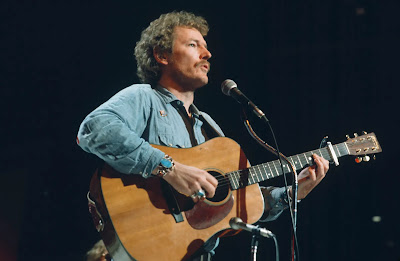Gordon Lightfoot
I was a country fan; I'd barely even heard the name Gordon Lightfoot before 1974. I'd heard some of his songs, but I didn't know they were his. Then in '74 I was working my first office job and our little three-desk closet contained, besides three people, an AM radio. For eight hours that radio yelped out the pop hits of the day. A lot of them were just dumb ~ The Streak, Seasons In The Sun, (You're) Having My Baby (one of the worst singles of all time). But there were a few standouts, none more than Sundown. I fell in love with the voice; I fell in love with the song.
Even many years later, when I wrote a song about that first work experience, I referenced Sundown:
As Lightfoot sings, he offers his dire warning
Tells me that I'd better take care
Sometimes we're drawn to voices that are different; an unfamiliar accent, perhaps, suggesting a far-off land. But often we cling to voices that sound like home. Lightfoot was Canadian and I grew up not far from the border, so the way he pronounced words was familiar. Someone told me once, "I can tell you're from North Dakota, because you sound Canadian." A weird juxtaposition, but regions don't simply break in two at some imaginary line. Thus, Gordon's voice warmed me, like listening to my dad speak.
Growing up with country music, I was familiar with songs like this:
And this:
I had no clue who wrote them and I didn't actually care. Teenagers can be rather cavalier. I only cared whether I liked the song or not. Later, it all made sense. Gordon Lightfoot, aside from being a master lyricist, wrote songs that had a haunting air, a keening loneliness. Lots of rain and whispering winds. Even living in Los Angeles, far away from Orillia, Ontario, he brought the ghosts with him. Melancholy rests in the bones of those borne of the cold prairie. Ian Tyson, also from Canada, shared that disposition. Just listen to Four Strong Winds.
More than a lyricist and a composer, though, Lightfoot was a painter ~ a painter of stories, scenes, settings:
There is a technique that songwriters use, a simple one, to capture a mood. Lightfoot used it a lot ~ minor chords. I like minor chords because they convey sadness, despair. When one is a lyrical genius, a minor chord melody provides the glacé. Notice that Cotton Jenny, one of his few upbeat compositions, was written in the key of G major.
As much as I treasure Sundown, there is another of Lightfoot's compositions that kicks me in the gut every time I hear it. When my kids were little, we vacationed many summers in Duluth, Minnesota, on the shore of Lake Superior. The town itself is old, rather threadbare, unless one motors up the big hill, far away from the water, to the staid residential neighborhoods with their split levels and four-wheelers parked in driveways. We preferred to keep to Highway 61, with its quaint fish cafes and road pullouts where one could breathe in the roaring waves and watch ominous clouds gather and screeching seagulls glide below them.
The harbor in Duluth is called Canal Park, where the iron ore ships maneuver through the channel on their mission to take on a new load or drop one off. The ships are magnificent, all rusty red and black and invariably emblazoned with the shipping owner's name. Across the harbor stretches the Aerial Lift Bridge, which must be raised in order for the ships to slip past. At Canal Park, one is immersed in history, heightened by a stroll through the maritime museum plopped down right beside the harbor and stuffed with ancient black and white photos alongside a giant steam engine and replica crew cabins. Every time, every single time I stepped inside the museum, a certain song wedged itself in my brain and didn't let go until we waved goodbye to Duluth in our rear view mirror.
The legend lives on from the Chippewa on downOf the big lake they called Gitche GumeeSuperior, they said, never gives up her deadWhen the gales of November come early
Some say Lightfoot considered this his masterpiece. It was.
I got to see Gordon Lightfoot in concert in 2001 at an old historic theater in downtown Minneapolis. He was in his sixties then and his performance was legendary. He wasn't the virile young man of Sundown; he was seasoned and not the least bit melancholy. Writers can write mournful songs but that doesn't make them hopelessly depressed. As much as a painter isn't his painting, a songwriter isn't his song.
I think it was all just the prairie winds.
Rest in peace, Gordon Lightfoot. Thank you for more than I can ever say.



Comments